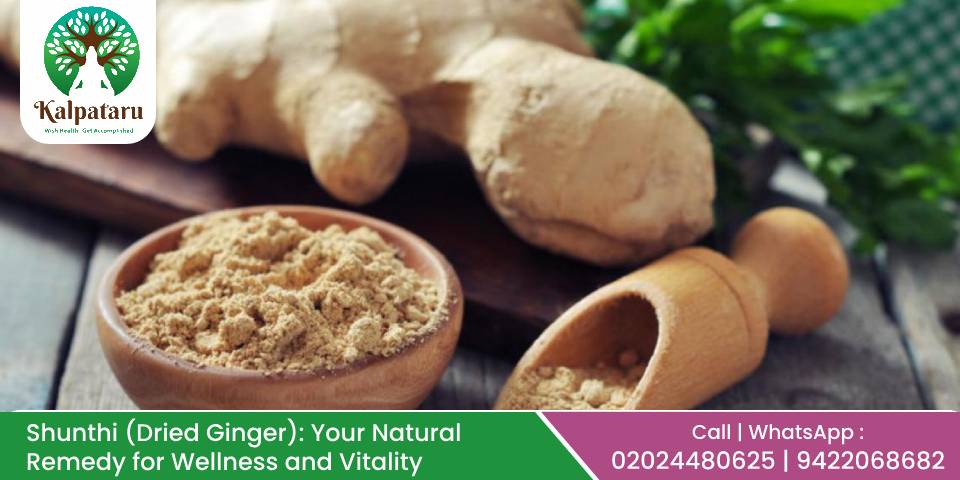Shunthi, also known as dried ginger, holds a significant place in Ayurvedic medicine and traditional health practices. Derived by drying fresh ginger, Shunthi concentrates the potent bioactive compounds of ginger, such as gingerol, shogaol, and zingerone. Revered for its therapeutic properties, Shunthi has been a trusted remedy in Ayurveda for centuries to balance the doshas and promote holistic wellness.
Ayurvedic Properties of Shunthi:
In Ayurveda, Shunthi is known for its unique combination of qualities:
- Rasa (Taste): Katu (Pungent)
- Guna (Qualities): Laghu (Light), Snigdha (Unctuous)
- Virya (Potency): Ushna (Hot)
- Vipaka (Post-digestive Effect): Madhura (Sweet)
These properties make Shunthi particularly effective in balancing Vata and Kapha doshas, while moderately increasing Pitta.
Health Benefits of Shunthi:
- Digestive Health: Shunthi is a powerful digestive aid that stimulates appetite, reduces bloating, and alleviates indigestion. Its carminative properties help in expelling gas and relieving indigestion. Shunthi tea is often recommended for improving gut health.
- Anti-inflammatory Properties: The active compounds in Shunthi, particularly gingerols and shogaols, have potent anti-inflammatory effects. It is highly effective in managing joint pain, arthritis, and other inflammatory conditions.
- Respiratory Wellness: Shunthi acts as a natural decongestant and expectorant. It is widely used in treating coughs, colds, and asthma by clearing mucus and soothing inflamed airways.
- Boosts Immunity: Rich in antioxidants, Shunthi strengthens the immune system and helps the body fight off infections. Its antimicrobial properties are particularly useful in preventing seasonal illnesses.
- Pain Relief: Shunthi is a natural analgesic and is effective in managing headaches, menstrual pain, and muscle soreness. Its heating qualities help in soothing discomfort.
- Metabolic Support: Shunthi is known to enhance metabolism, promoting better nutrient absorption and fat digestion. It is often used in Ayurvedic weight management regimens.
- Cardiovascular Health: Dried ginger helps in reducing cholesterol levels, improving blood circulation, and preventing clot formation, thereby supporting heart health.
- Regulation of Blood Sugar: Shunthi has been found to regulate blood sugar levels, making it beneficial for individuals with diabetes. It enhances insulin sensitivity and aids in managing glycemic control.
Ayurvedic Remedies with Shunthi:
- For Digestive Issues: Mix 1/4 teaspoon of Shunthi powder with warm water and a pinch of rock salt. Consume after meals for better digestion.
- For Respiratory Health: Prepare a decoction with Shunthi, Tulsi leaves, and honey to alleviate cough and cold.
- For Joint Pain: Apply a paste of Shunthi powder mixed with warm sesame oil on affected areas to reduce pain and inflammation.
- For Weight Loss: Drink warm water infused with Shunthi, lemon, and honey in the morning to boost metabolism and aid fat burning.
- For Menstrual Pain: A cup of Shunthi tea can help ease cramps and regulate menstrual flow.
Incorporating Shunthi in Daily Life:
Shunthi can be easily added to your daily diet. Use it as a spice in soups, teas, or curries to enhance flavor and nutritional value. Shunthi powder can also be consumed as a supplement, but always consult an Ayurvedic practitioner for personalized advice.
Precautions and Contraindications:
While Shunthi is generally safe, it is important to keep the following in mind:
- Avoid excessive use if you have high Pitta-related conditions like hyperacidity.
- Pregnant and lactating women should consult a healthcare provider before consuming large quantities.
- People on blood-thinning medications should use Shunthi cautiously.
Conclusion:
Shunthi is truly a marvel of Ayurveda, offering a natural and effective way to address numerous health concerns. From enhancing digestion to boosting immunity and supporting cardiovascular health, its benefits are vast and well-documented. Incorporating this versatile herb into your daily routine can pave the way for improved health and well-being. Always remember, balance and moderation are key to reaping the best benefits of Ayurvedic herbs like Shunthi. Due to this diversified usage of Shunthi it is called as “Mahaushadhi” in Ayurveda
Embrace the power of Shunthi for a healthier, more vibrant life!
Dr. Manoj Deshpande and Dr. Aparna Deshpande at Kalpataru Ayurvediya Chikitsalaya™ Clinic provide the best Ayurvedic Treatment for Psoriasis & various diseases in Pune, Maharashtra. For more information about our comprehensive treatment options, or to requestan appointment with the best Ayurvedic Doctor in Pune, call +919422068682 / +919764837167 / 020-24480625 or Click on Book an Appointment.

